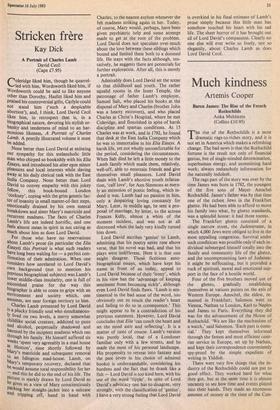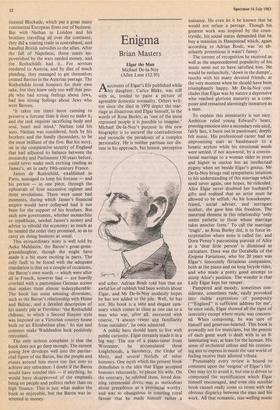Much kindness
Artemis Cooper
Baron James: The Rise of the French Rothschilds Anka Muhlstein (Collins £10.95) The rise of the Rothschilds is a most dramatic rags-to-riches story, and it is not set in America which makes a refreshing change. The bad news is that the Rothschild fortune is the result not only of financial genius, but of single-minded determination, superhuman energy, and unremitting hard work; always melancholy information for the naturally indolent.
The rags part of the story was over by the time James was born in 1792, the youngest of the five sons of Mayer Amschel Rothschild. James's father was by that time one of the richest Jews in the Frankfurt ghetto. He had been able to afford to move his family into what, by ghetto standards, was a splendid house: it had three rooms.
The Frankfurt ghetto consisted of a single narrow street, the Judenstrasse, in which 4,000 Jews were obliged to live in the most appalling congestion. Survival under such conditions was possible onlrif each in- dividual submerged himself totally into the family and community life of the ghetto, and the uncompromising laws of Judaism: it might be suffocating, but it provided a rock of spiritual, moral and emotional sup- port in the face of a hostile world.
Four of the five brothers moved out of the ghetto, gradually establishing themselves at various points on the axis of Western Europe. Amschel, the eldest, re- mained in Frankfurt; Salomon went to Vienna, Nathan to London, Karl to Naples and James to Paris. Everything they did was for the advancement of the House of Rothschild. 'We are like the mechanism of a watch,' said Salomon. 'Each part is essen- tial.' They kept themselves informed through the fastest and most efficient cour- rier service in Europe, set up by Nathan, and kept their correspondence conveniently spy-proof by the simple expedient of writing in Yiddish.
There were very few things that the in- dustry of the Rothschilds could not put to good effect. They worked hard for what they got, but at the same time it is almost uncanny to see how time and events played into their hands. They made an enormous amount of money at the time of the Con- tinental Blockade, which put a great many continental European firms out of business. But with Nathan in London and his brothers travelling all over the continent, they did a roaring trade in contraband, and handled British subsidies to the allies. After the fall of Napoleon, those states im- poverished by the wars needed money, and the Rothschilds had it. For services rendered to Austria, and by dint of much pleading, they managed to get themselves created Barons in the Austrian peerage. The Rothschilds loved honours for their own sake, but they knew only too well that peo- ple who had strong feelings about Jews, had less strong feelings about Jews who were Barons.
'It takes ten times more cunning to preserve a fortune than it does to make it, and the task requires sacrificing body and soul, heart and mind,' Nathan told his sons. Nathan was considered, both by his brothers and the family chroniclers, to be the most brilliant of the five. But his story, set in the comparative security of England that had adjusted its balance between the monarchy and Parliament 150 years before, could never make such exciting reading as James's, set in early 19th-century France.
James de Rothschild, established in Paris, managed to keep his fortune — and his person — in one piece, through the upheavals of four successive regimes and three revolutions. There were some bad moments, during which James's financial empire would have collapsed had it not been for the support of his brothers. But each new government, whether monarchist or republican, needed James's money and advice to rebuild the economy; as much as he needed the order they promised, so as to carry on doing business as usual.
This extraordinary story is well told by Anka Muhlstein, the Baron's great-great- granddaughter, though she might have made it a bit more exciting in parts. The only fault to be found with the adequate translation is that on a couple of occasions, the Baron's own words — which were after all in French, however bad — are heavily overlaid with a pantomime German accent that makes them almost indecypherable. The book has some amusing diversions, such as the Baron's relationship with Heine and Balzac, and a detailed description of his stately pile at Ferrieres: 'the Rothschild château, in which a Second Empire style was imposed on a Victorian country house built on an Elizabethan plan.' Its size and contents make Waddesdon look positively restrained.
The only serious complaint is that the book does not go deep enough. The earnest young Jew develops well into the patriar- chal figure of the Baron, but the people and events around him move too fast ever to achieve any substance. I doubt if the Baron would have minded this — if' anything, he would have disapproved of the emphasis being on people and politics rather than on high finance. This is just what makes the book so enjoyable, but the Baron was in- terested in money.







































 Previous page
Previous page